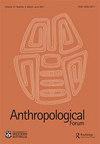“重生”暴力的过去:冲突后记忆公理与柬埔寨佛教遗忘之间的摩擦
IF 0.7
3区 社会学
Q3 ANTHROPOLOGY
引用次数: 3
摘要
冲突后人权(HR)制度中关键机制的白话化问题,对柬埔寨对话者的民族志采访提出了对受害者-犯罪者外展与和解,真相讲述和纪念的抵制。这种抗拒源于佛教关注现在和未来的观点与欧洲西方(EW)关注过去的记忆工作之间的不可通约性,这对上述冲突后和解机制至关重要。EW记忆工作的白化不仅被认为是文化上的不一致,而且似乎威胁到与种族灭绝有关的痛苦和冲突的复苏,而人力资源政权希望缓解这种痛苦和冲突。与其呼吁提高白话化记忆工作的文化能力,研究揭示了被视为理所当然的核心EW助记公理(和场景)的不可通约性,即检索痛苦的过去及其公开代表可能在某种程度上促进愈合、康复和未来冲突的预防。作为冲突预防的人力资源模型的多种机制中的共同点,这一公理将在关于纪念的人力资源话语中被认识论和历史语境化。将考虑对纪念、预防冲突和维持公理暴力的人力资源制度的全球化实践的未来的影响。本文章由计算机程序翻译,如有差异,请以英文原文为准。
‘Rebirthing’ the Violent Past: Friction Between Post-Conflict Axioms of Remembrance and Cambodian Buddhist Forgetting
ABSTRACT Problematising the vernacularisation of key mechanisms in post-conflict Human Rights (HR) regimes, ethnographic interviews with Cambodian interlocutors present resistance to victim-perpetrator outreach and reconciliation, truth telling, and memorialisation. Resistance stems from the incommensurability between Buddhist present and future-focused perspectives and Euro Western (EW) past-focused memory work so central to the above mechanisms of post-conflict reconciliation. The vernacularisation of EW memory work is not only perceived as culturally incongruent, but appears to threaten a resurgence of genocide-related distress and strife that the HR regime hoped to assuage. Rather than calling for improved cultural competency of vernacularised memory work, accounts disclose the incommensurability of the taken for granted core EW mnemonic axiom (and scenario) that retrieval of the painful past and its public representation may somehow promote healing, rehabilitation and future conflict prevention. As common denominator embedded within multiple mechanisms of the HR model of conflict prevention, this axiom will be epistemically and historically contextualised in HR discourse on memorialisation. Implications will be considered for the future of globalised practices of memorialisation, conflict prevention and the HR regime sustaining axiomatic violence.
求助全文
通过发布文献求助,成功后即可免费获取论文全文。
去求助
来源期刊

Anthropological Forum
ANTHROPOLOGY-
CiteScore
3.60
自引率
10.00%
发文量
14
期刊介绍:
Anthropological Forum is a journal of social anthropology and comparative sociology that was founded in 1963 and has a distinguished publication history. The journal provides a forum for both established and innovative approaches to anthropological research. A special section devoted to contributions on applied anthropology appears periodically. The editors are especially keen to publish new approaches based on ethnographic and theoretical work in the journal"s established areas of strength: Australian culture and society, Aboriginal Australia, Southeast Asia and the Pacific.
 求助内容:
求助内容: 应助结果提醒方式:
应助结果提醒方式:


